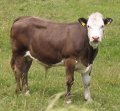 Is it just me or is there a certain irony to be found in the timing of a rare cattle and other animal breeds conservation initiative being announced in the UK and stem cell researchers at Newcastle University requesting authorisation to hybridize nuclear-free eggs from cows with a human skin cell nucleus?
Is it just me or is there a certain irony to be found in the timing of a rare cattle and other animal breeds conservation initiative being announced in the UK and stem cell researchers at Newcastle University requesting authorisation to hybridize nuclear-free eggs from cows with a human skin cell nucleus?
Ironic or not, both are issues that will inevitably attract great controversy over coming days.
The rare breeds initiative will build a database of livestock breeds across the UK to help. Announcing the launch of this genetic “Noah’s Ark”, the Department for Environment, Food and Rural Affairs sets out recommendations for how the industry and Government can improve and maintain the diversity of the UK’s livestock genetic material in the future. Among its detailed recommendations are the maintenance of an advisory body that better informs the public, industry and policymakers on the country’s farm animal breeds, the collection of high-quality information on genetic resources to provide effective ways for their future use, and support for the prioritisation, development and implementation of projects to conserve genetic diversity.
‘This plan is important economically, socially and culturally,’ says Food and Farming Minister Jeff Rooker, ‘We have a fine tradition in this country of breeding a diverse range of farm animals which in many cases can be found across the world.
‘However, there are growing concerns over genetic diversity as growing economic pressures have lead to a few specialised breeds spreading across the globe. The threat of exotic diseases is also a threat to diversity in some breeds.”
On the same day, scientists at the University of Newcastle upon Tyne sought regulatory approval to fuse an egg from a cow that has had its nucleus removed, with the nucleus of a human tissue cell, from skin for instance. The resulting hybrid, which would essentially be 99.9% human with only a tiny amount of mitochondrial DNA from the cow remaining. The egg could then be cultured and stem cells that are human to all intents and purposes, harvested from the growing chimera. The hybrid embryo would, the researchers say, be destroyed once the stem cells were collected.
They point out that human eggs are a precious and scarce a commodity, whereas there is a glut of cow eggs. Cow eggs are also a lot easier to handle than the eggs from the conventional source of laboratory test eggs, the mouse.
The UK’s Human Fertilisation and Embryology Authority (HFEA) is yet to grant permission although teams at Edinburgh University and King’s College London are also seeking approval for similar research.
The aim of creating such a human-cow hybrid is to develop the techniques that will eventually be used to create 100% human stem cells in the laboratory without having to expend years of human eggs honing the necessary skills that will ultimately make stem cell production routing.
Both strands of research, the genetic conservation program and the human-cow hybrid are already provoking a reaction from those who consider such efforts a violation of animal rights, another example of human exploitation of animals, and the lobbyists who want an outright ban on stem cell research.
Stephen Minger of King’s College London told journalists that, “We feel that the development of disease-specific human embryonic stem cell lines from individuals suffering from genetic forms of neurodegenerative disorders will stimulate both basic research and the development of new medicines to treat these horrific brain diseases.”
PS Before anyone says, yes, I know it’s a picture of a bullock not a cow and that, yes, you’d be hard pushed to extract cattle eggs from him, hybridised or not!